ICMS HOS803: Annotated Bibliography on Sustainable Tourism Strategies
VerifiedAdded on 2022/10/02
|10
|1712
|63
Annotated Bibliography
AI Summary
This annotated bibliography focuses on the promotion of sustainable tourism, examining five relevant articles to understand its multifaceted aspects. The study begins with an executive summary highlighting the importance of sustainable tourism in balancing social, economic, and cultural elements to maintain biodiversity and the tourism sector's longevity. Each article is then reviewed, providing concise descriptions, evaluations, and relevance to the research topic. The articles explore topics such as overtourism, community involvement in heritage conservation, ethical business practices, local resident attitudes toward tourism development, and the governance of tourism networks. While the articles offer valuable insights, limitations such as the reliance on secondary data and limited sample sizes are noted. The bibliography concludes by emphasizing the importance of sustainable tourism development for the growth of the tourism sector and identifies areas for further research, particularly in addressing overtourism, enhancing community involvement, and improving the effectiveness of tourism networks.
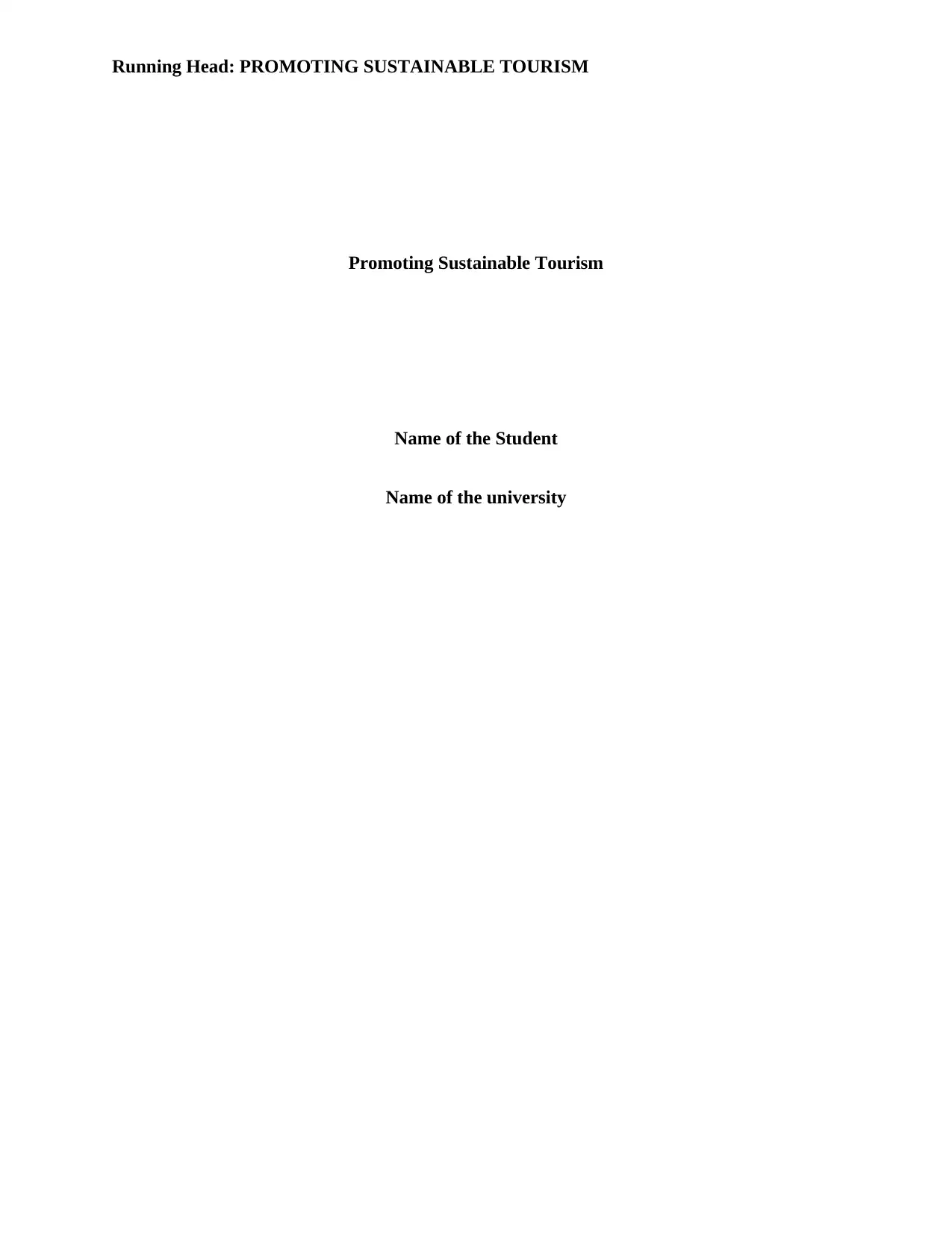
Running Head: PROMOTING SUSTAINABLE TOURISM
Promoting Sustainable Tourism
Name of the Student
Name of the university
Promoting Sustainable Tourism
Name of the Student
Name of the university
Paraphrase This Document
Need a fresh take? Get an instant paraphrase of this document with our AI Paraphraser
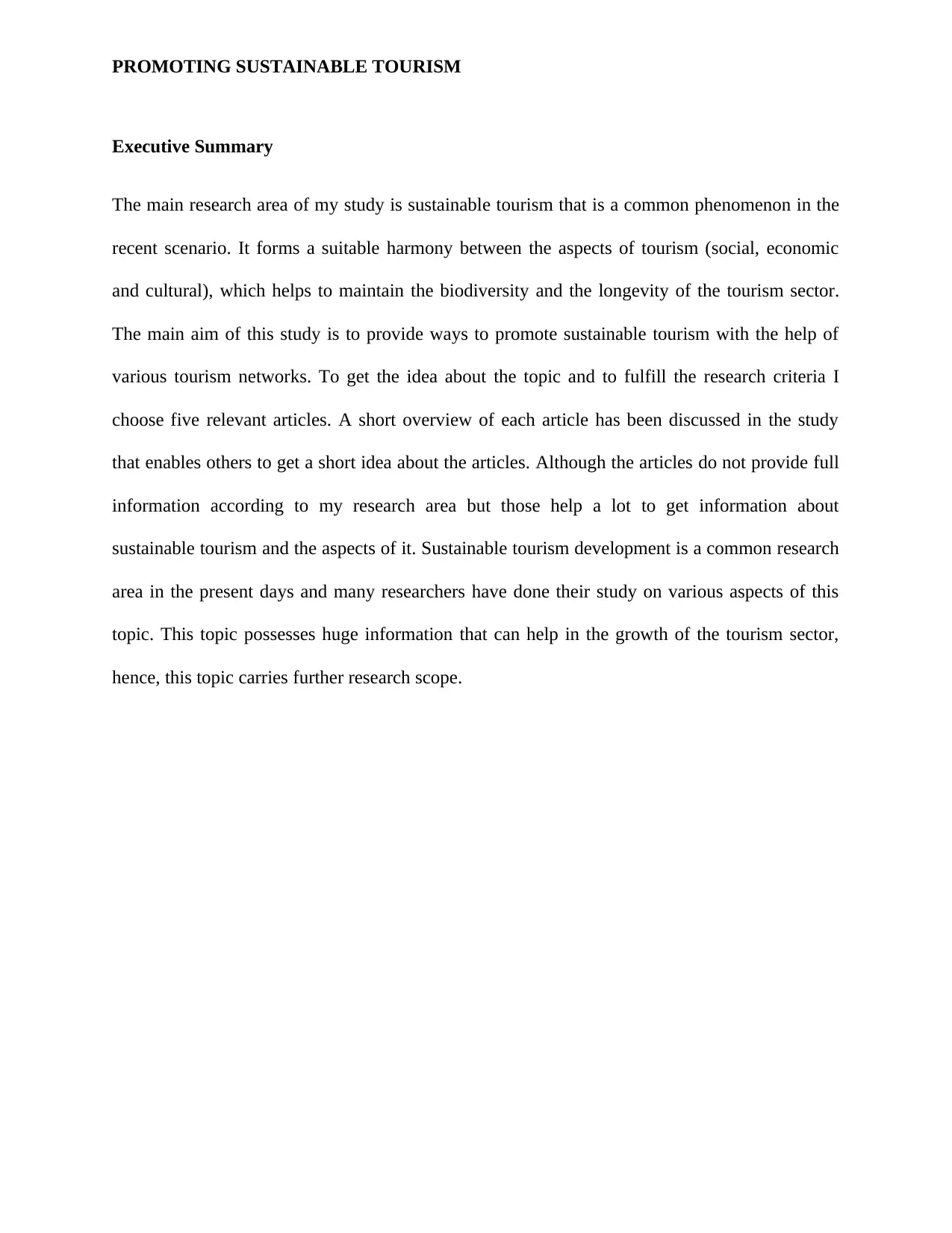
PROMOTING SUSTAINABLE TOURISM
Executive Summary
The main research area of my study is sustainable tourism that is a common phenomenon in the
recent scenario. It forms a suitable harmony between the aspects of tourism (social, economic
and cultural), which helps to maintain the biodiversity and the longevity of the tourism sector.
The main aim of this study is to provide ways to promote sustainable tourism with the help of
various tourism networks. To get the idea about the topic and to fulfill the research criteria I
choose five relevant articles. A short overview of each article has been discussed in the study
that enables others to get a short idea about the articles. Although the articles do not provide full
information according to my research area but those help a lot to get information about
sustainable tourism and the aspects of it. Sustainable tourism development is a common research
area in the present days and many researchers have done their study on various aspects of this
topic. This topic possesses huge information that can help in the growth of the tourism sector,
hence, this topic carries further research scope.
Executive Summary
The main research area of my study is sustainable tourism that is a common phenomenon in the
recent scenario. It forms a suitable harmony between the aspects of tourism (social, economic
and cultural), which helps to maintain the biodiversity and the longevity of the tourism sector.
The main aim of this study is to provide ways to promote sustainable tourism with the help of
various tourism networks. To get the idea about the topic and to fulfill the research criteria I
choose five relevant articles. A short overview of each article has been discussed in the study
that enables others to get a short idea about the articles. Although the articles do not provide full
information according to my research area but those help a lot to get information about
sustainable tourism and the aspects of it. Sustainable tourism development is a common research
area in the present days and many researchers have done their study on various aspects of this
topic. This topic possesses huge information that can help in the growth of the tourism sector,
hence, this topic carries further research scope.
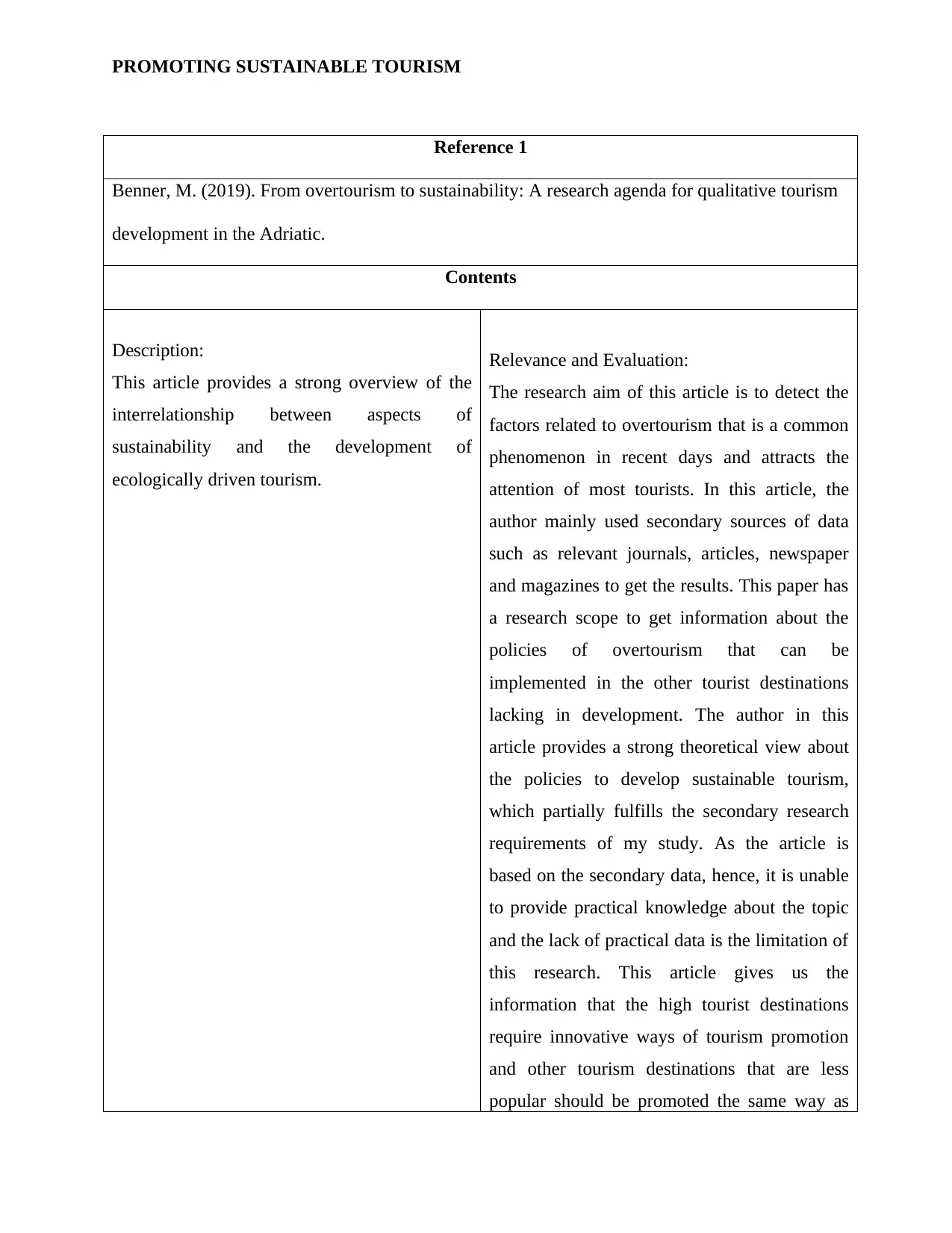
PROMOTING SUSTAINABLE TOURISM
Reference 1
Benner, M. (2019). From overtourism to sustainability: A research agenda for qualitative tourism
development in the Adriatic.
Contents
Description:
This article provides a strong overview of the
interrelationship between aspects of
sustainability and the development of
ecologically driven tourism.
Relevance and Evaluation:
The research aim of this article is to detect the
factors related to overtourism that is a common
phenomenon in recent days and attracts the
attention of most tourists. In this article, the
author mainly used secondary sources of data
such as relevant journals, articles, newspaper
and magazines to get the results. This paper has
a research scope to get information about the
policies of overtourism that can be
implemented in the other tourist destinations
lacking in development. The author in this
article provides a strong theoretical view about
the policies to develop sustainable tourism,
which partially fulfills the secondary research
requirements of my study. As the article is
based on the secondary data, hence, it is unable
to provide practical knowledge about the topic
and the lack of practical data is the limitation of
this research. This article gives us the
information that the high tourist destinations
require innovative ways of tourism promotion
and other tourism destinations that are less
popular should be promoted the same way as
Reference 1
Benner, M. (2019). From overtourism to sustainability: A research agenda for qualitative tourism
development in the Adriatic.
Contents
Description:
This article provides a strong overview of the
interrelationship between aspects of
sustainability and the development of
ecologically driven tourism.
Relevance and Evaluation:
The research aim of this article is to detect the
factors related to overtourism that is a common
phenomenon in recent days and attracts the
attention of most tourists. In this article, the
author mainly used secondary sources of data
such as relevant journals, articles, newspaper
and magazines to get the results. This paper has
a research scope to get information about the
policies of overtourism that can be
implemented in the other tourist destinations
lacking in development. The author in this
article provides a strong theoretical view about
the policies to develop sustainable tourism,
which partially fulfills the secondary research
requirements of my study. As the article is
based on the secondary data, hence, it is unable
to provide practical knowledge about the topic
and the lack of practical data is the limitation of
this research. This article gives us the
information that the high tourist destinations
require innovative ways of tourism promotion
and other tourism destinations that are less
popular should be promoted the same way as
⊘ This is a preview!⊘
Do you want full access?
Subscribe today to unlock all pages.

Trusted by 1+ million students worldwide
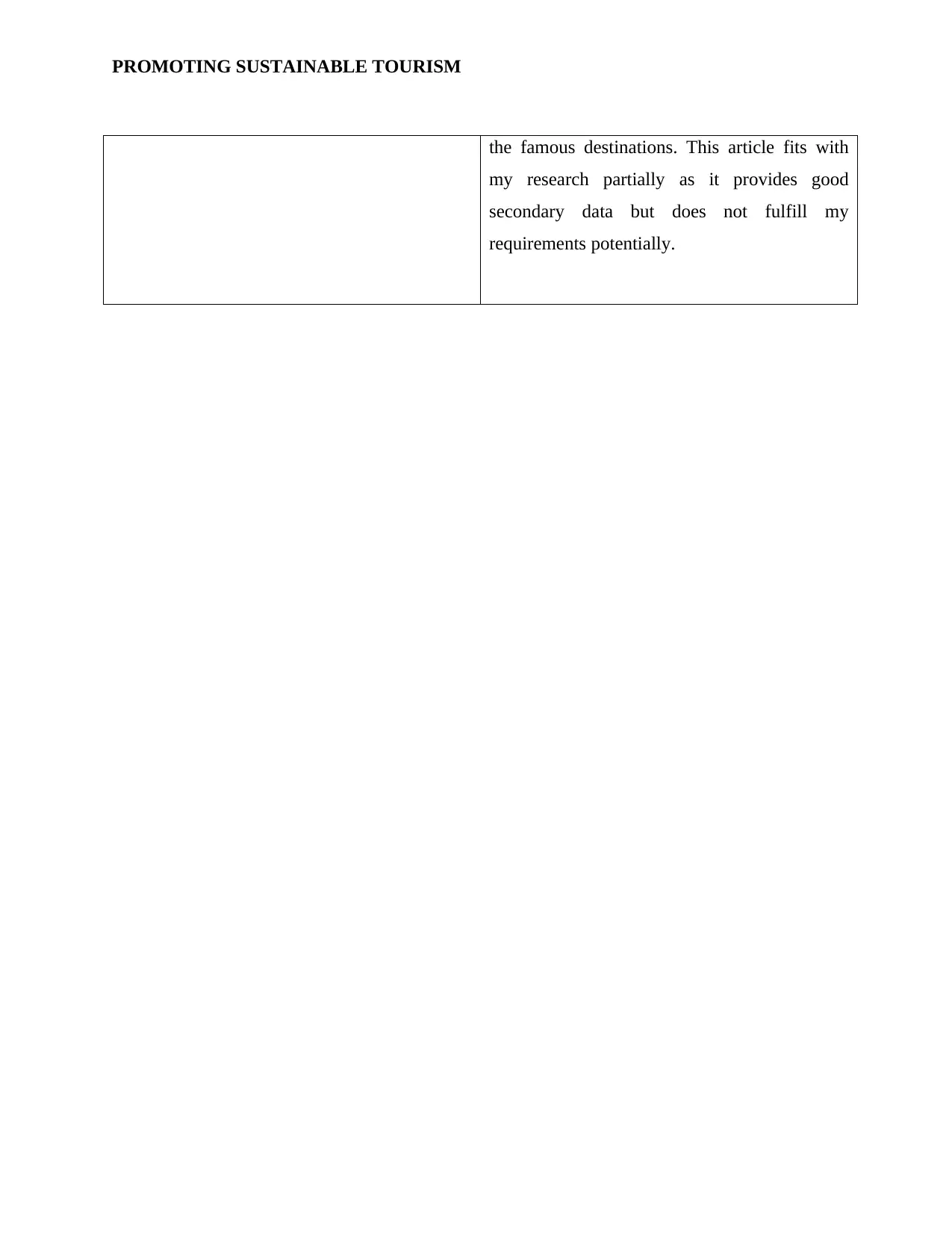
PROMOTING SUSTAINABLE TOURISM
the famous destinations. This article fits with
my research partially as it provides good
secondary data but does not fulfill my
requirements potentially.
the famous destinations. This article fits with
my research partially as it provides good
secondary data but does not fulfill my
requirements potentially.
Paraphrase This Document
Need a fresh take? Get an instant paraphrase of this document with our AI Paraphraser
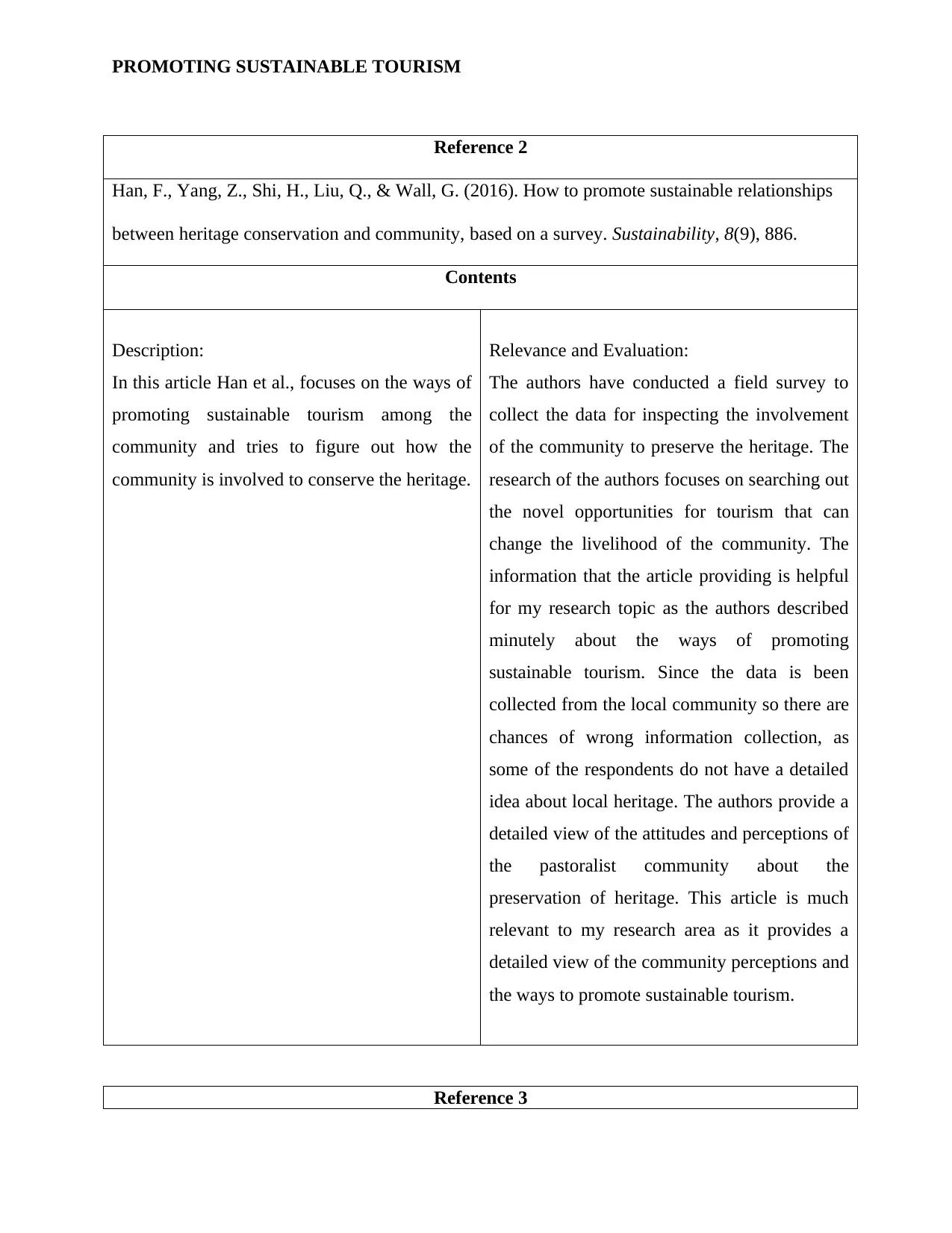
PROMOTING SUSTAINABLE TOURISM
Reference 2
Han, F., Yang, Z., Shi, H., Liu, Q., & Wall, G. (2016). How to promote sustainable relationships
between heritage conservation and community, based on a survey. Sustainability, 8(9), 886.
Contents
Description:
In this article Han et al., focuses on the ways of
promoting sustainable tourism among the
community and tries to figure out how the
community is involved to conserve the heritage.
Relevance and Evaluation:
The authors have conducted a field survey to
collect the data for inspecting the involvement
of the community to preserve the heritage. The
research of the authors focuses on searching out
the novel opportunities for tourism that can
change the livelihood of the community. The
information that the article providing is helpful
for my research topic as the authors described
minutely about the ways of promoting
sustainable tourism. Since the data is been
collected from the local community so there are
chances of wrong information collection, as
some of the respondents do not have a detailed
idea about local heritage. The authors provide a
detailed view of the attitudes and perceptions of
the pastoralist community about the
preservation of heritage. This article is much
relevant to my research area as it provides a
detailed view of the community perceptions and
the ways to promote sustainable tourism.
Reference 3
Reference 2
Han, F., Yang, Z., Shi, H., Liu, Q., & Wall, G. (2016). How to promote sustainable relationships
between heritage conservation and community, based on a survey. Sustainability, 8(9), 886.
Contents
Description:
In this article Han et al., focuses on the ways of
promoting sustainable tourism among the
community and tries to figure out how the
community is involved to conserve the heritage.
Relevance and Evaluation:
The authors have conducted a field survey to
collect the data for inspecting the involvement
of the community to preserve the heritage. The
research of the authors focuses on searching out
the novel opportunities for tourism that can
change the livelihood of the community. The
information that the article providing is helpful
for my research topic as the authors described
minutely about the ways of promoting
sustainable tourism. Since the data is been
collected from the local community so there are
chances of wrong information collection, as
some of the respondents do not have a detailed
idea about local heritage. The authors provide a
detailed view of the attitudes and perceptions of
the pastoralist community about the
preservation of heritage. This article is much
relevant to my research area as it provides a
detailed view of the community perceptions and
the ways to promote sustainable tourism.
Reference 3
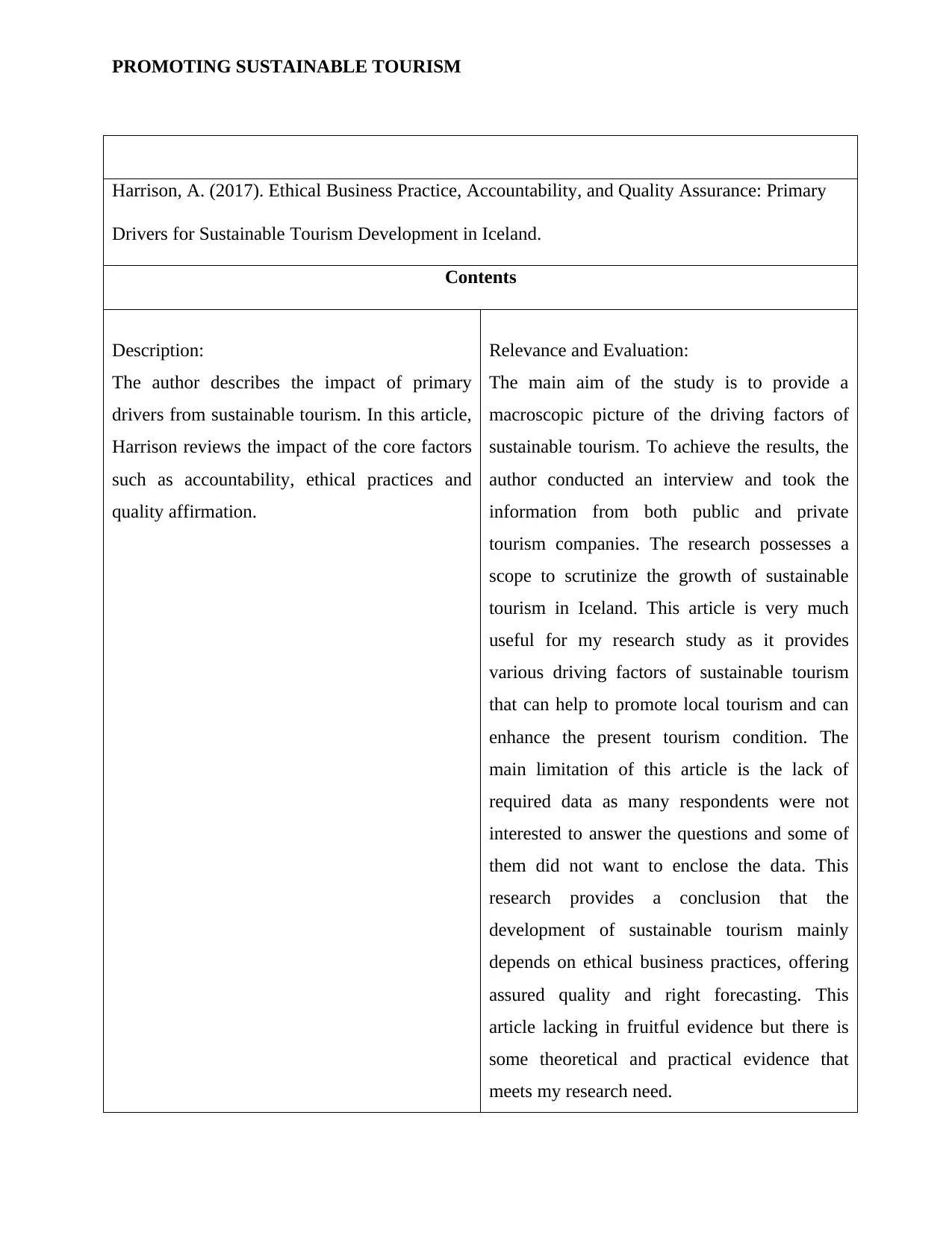
PROMOTING SUSTAINABLE TOURISM
Harrison, A. (2017). Ethical Business Practice, Accountability, and Quality Assurance: Primary
Drivers for Sustainable Tourism Development in Iceland.
Contents
Description:
The author describes the impact of primary
drivers from sustainable tourism. In this article,
Harrison reviews the impact of the core factors
such as accountability, ethical practices and
quality affirmation.
Relevance and Evaluation:
The main aim of the study is to provide a
macroscopic picture of the driving factors of
sustainable tourism. To achieve the results, the
author conducted an interview and took the
information from both public and private
tourism companies. The research possesses a
scope to scrutinize the growth of sustainable
tourism in Iceland. This article is very much
useful for my research study as it provides
various driving factors of sustainable tourism
that can help to promote local tourism and can
enhance the present tourism condition. The
main limitation of this article is the lack of
required data as many respondents were not
interested to answer the questions and some of
them did not want to enclose the data. This
research provides a conclusion that the
development of sustainable tourism mainly
depends on ethical business practices, offering
assured quality and right forecasting. This
article lacking in fruitful evidence but there is
some theoretical and practical evidence that
meets my research need.
Harrison, A. (2017). Ethical Business Practice, Accountability, and Quality Assurance: Primary
Drivers for Sustainable Tourism Development in Iceland.
Contents
Description:
The author describes the impact of primary
drivers from sustainable tourism. In this article,
Harrison reviews the impact of the core factors
such as accountability, ethical practices and
quality affirmation.
Relevance and Evaluation:
The main aim of the study is to provide a
macroscopic picture of the driving factors of
sustainable tourism. To achieve the results, the
author conducted an interview and took the
information from both public and private
tourism companies. The research possesses a
scope to scrutinize the growth of sustainable
tourism in Iceland. This article is very much
useful for my research study as it provides
various driving factors of sustainable tourism
that can help to promote local tourism and can
enhance the present tourism condition. The
main limitation of this article is the lack of
required data as many respondents were not
interested to answer the questions and some of
them did not want to enclose the data. This
research provides a conclusion that the
development of sustainable tourism mainly
depends on ethical business practices, offering
assured quality and right forecasting. This
article lacking in fruitful evidence but there is
some theoretical and practical evidence that
meets my research need.
⊘ This is a preview!⊘
Do you want full access?
Subscribe today to unlock all pages.

Trusted by 1+ million students worldwide
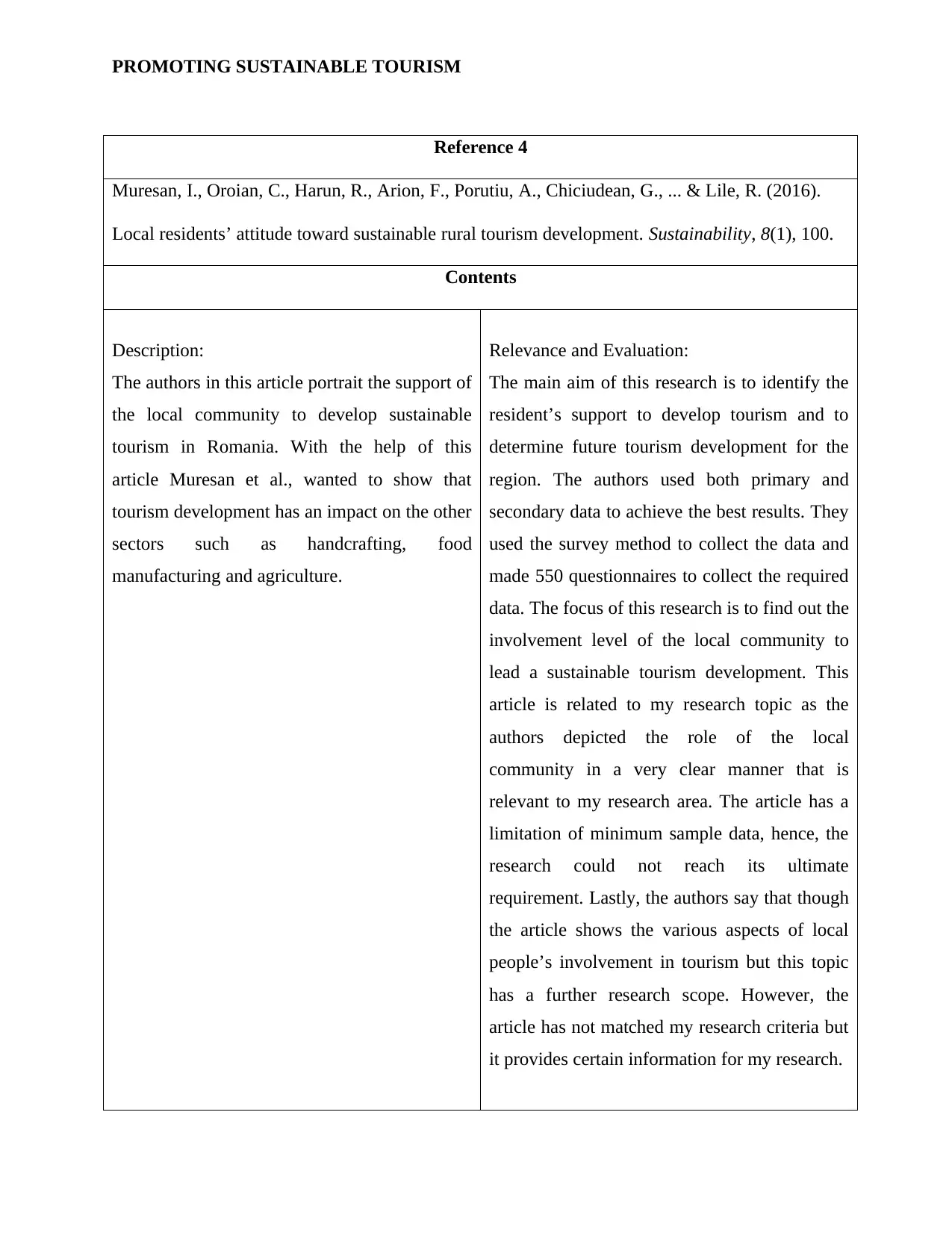
PROMOTING SUSTAINABLE TOURISM
Reference 4
Muresan, I., Oroian, C., Harun, R., Arion, F., Porutiu, A., Chiciudean, G., ... & Lile, R. (2016).
Local residents’ attitude toward sustainable rural tourism development. Sustainability, 8(1), 100.
Contents
Description:
The authors in this article portrait the support of
the local community to develop sustainable
tourism in Romania. With the help of this
article Muresan et al., wanted to show that
tourism development has an impact on the other
sectors such as handcrafting, food
manufacturing and agriculture.
Relevance and Evaluation:
The main aim of this research is to identify the
resident’s support to develop tourism and to
determine future tourism development for the
region. The authors used both primary and
secondary data to achieve the best results. They
used the survey method to collect the data and
made 550 questionnaires to collect the required
data. The focus of this research is to find out the
involvement level of the local community to
lead a sustainable tourism development. This
article is related to my research topic as the
authors depicted the role of the local
community in a very clear manner that is
relevant to my research area. The article has a
limitation of minimum sample data, hence, the
research could not reach its ultimate
requirement. Lastly, the authors say that though
the article shows the various aspects of local
people’s involvement in tourism but this topic
has a further research scope. However, the
article has not matched my research criteria but
it provides certain information for my research.
Reference 4
Muresan, I., Oroian, C., Harun, R., Arion, F., Porutiu, A., Chiciudean, G., ... & Lile, R. (2016).
Local residents’ attitude toward sustainable rural tourism development. Sustainability, 8(1), 100.
Contents
Description:
The authors in this article portrait the support of
the local community to develop sustainable
tourism in Romania. With the help of this
article Muresan et al., wanted to show that
tourism development has an impact on the other
sectors such as handcrafting, food
manufacturing and agriculture.
Relevance and Evaluation:
The main aim of this research is to identify the
resident’s support to develop tourism and to
determine future tourism development for the
region. The authors used both primary and
secondary data to achieve the best results. They
used the survey method to collect the data and
made 550 questionnaires to collect the required
data. The focus of this research is to find out the
involvement level of the local community to
lead a sustainable tourism development. This
article is related to my research topic as the
authors depicted the role of the local
community in a very clear manner that is
relevant to my research area. The article has a
limitation of minimum sample data, hence, the
research could not reach its ultimate
requirement. Lastly, the authors say that though
the article shows the various aspects of local
people’s involvement in tourism but this topic
has a further research scope. However, the
article has not matched my research criteria but
it provides certain information for my research.
Paraphrase This Document
Need a fresh take? Get an instant paraphrase of this document with our AI Paraphraser
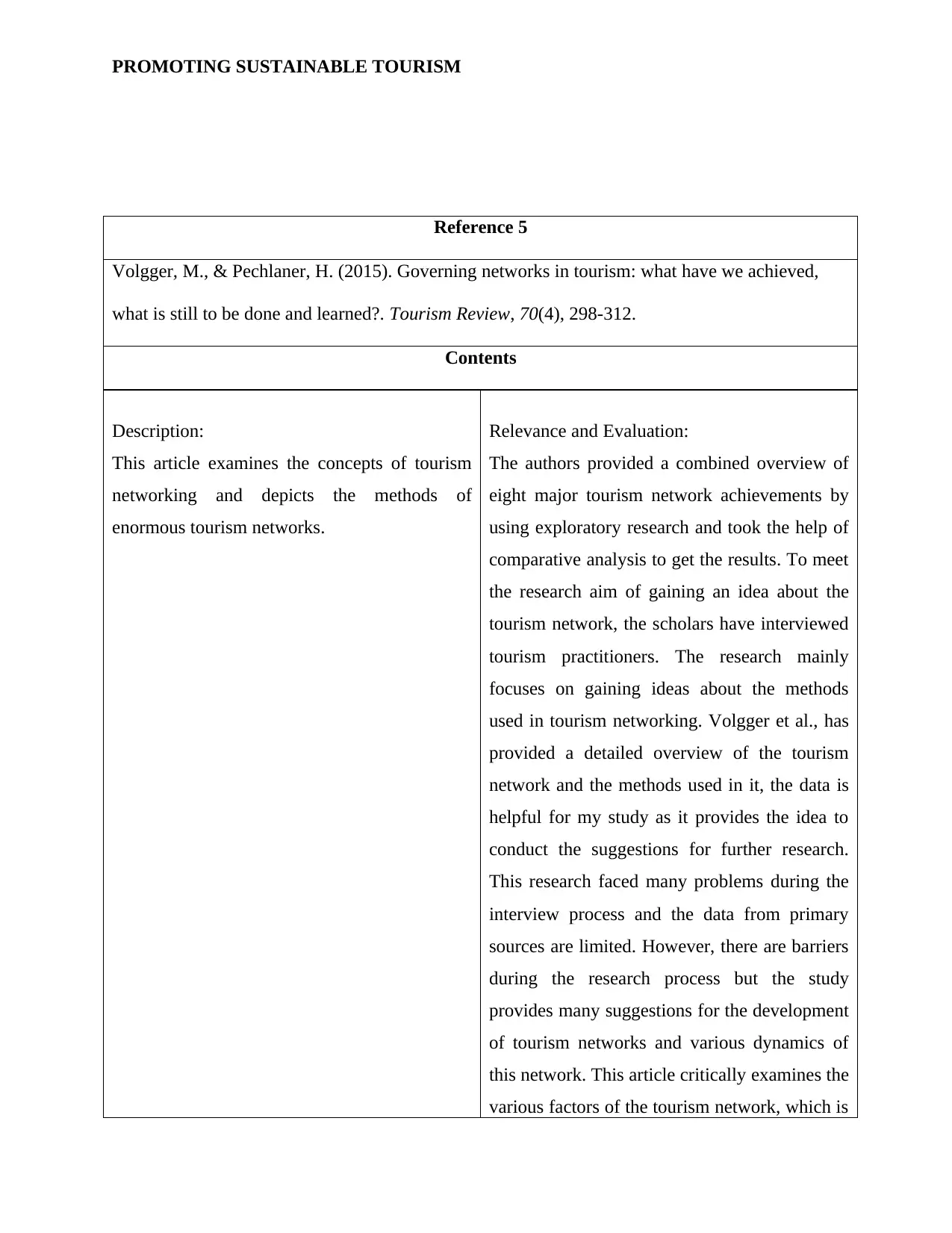
PROMOTING SUSTAINABLE TOURISM
Reference 5
Volgger, M., & Pechlaner, H. (2015). Governing networks in tourism: what have we achieved,
what is still to be done and learned?. Tourism Review, 70(4), 298-312.
Contents
Description:
This article examines the concepts of tourism
networking and depicts the methods of
enormous tourism networks.
Relevance and Evaluation:
The authors provided a combined overview of
eight major tourism network achievements by
using exploratory research and took the help of
comparative analysis to get the results. To meet
the research aim of gaining an idea about the
tourism network, the scholars have interviewed
tourism practitioners. The research mainly
focuses on gaining ideas about the methods
used in tourism networking. Volgger et al., has
provided a detailed overview of the tourism
network and the methods used in it, the data is
helpful for my study as it provides the idea to
conduct the suggestions for further research.
This research faced many problems during the
interview process and the data from primary
sources are limited. However, there are barriers
during the research process but the study
provides many suggestions for the development
of tourism networks and various dynamics of
this network. This article critically examines the
various factors of the tourism network, which is
Reference 5
Volgger, M., & Pechlaner, H. (2015). Governing networks in tourism: what have we achieved,
what is still to be done and learned?. Tourism Review, 70(4), 298-312.
Contents
Description:
This article examines the concepts of tourism
networking and depicts the methods of
enormous tourism networks.
Relevance and Evaluation:
The authors provided a combined overview of
eight major tourism network achievements by
using exploratory research and took the help of
comparative analysis to get the results. To meet
the research aim of gaining an idea about the
tourism network, the scholars have interviewed
tourism practitioners. The research mainly
focuses on gaining ideas about the methods
used in tourism networking. Volgger et al., has
provided a detailed overview of the tourism
network and the methods used in it, the data is
helpful for my study as it provides the idea to
conduct the suggestions for further research.
This research faced many problems during the
interview process and the data from primary
sources are limited. However, there are barriers
during the research process but the study
provides many suggestions for the development
of tourism networks and various dynamics of
this network. This article critically examines the
various factors of the tourism network, which is
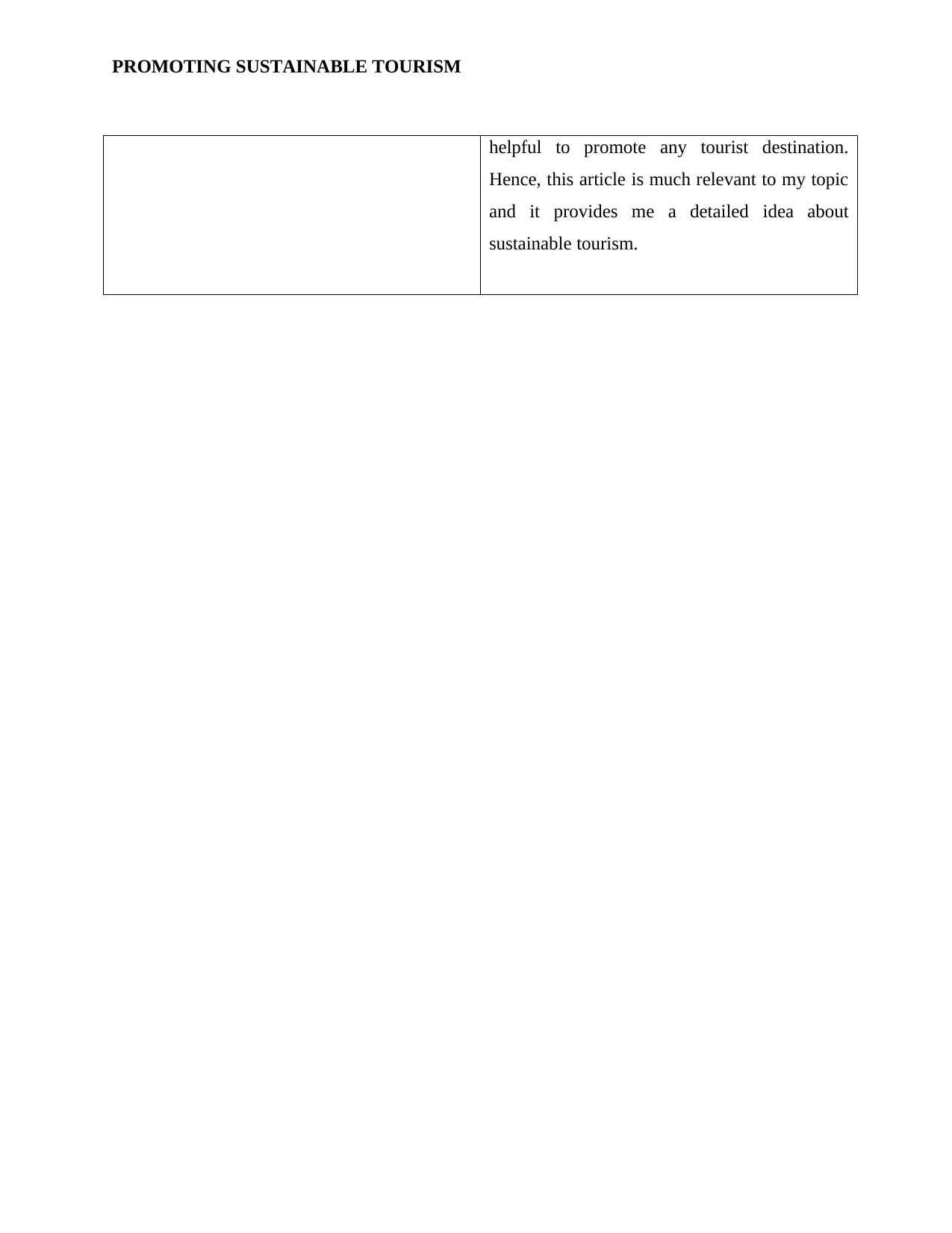
PROMOTING SUSTAINABLE TOURISM
helpful to promote any tourist destination.
Hence, this article is much relevant to my topic
and it provides me a detailed idea about
sustainable tourism.
helpful to promote any tourist destination.
Hence, this article is much relevant to my topic
and it provides me a detailed idea about
sustainable tourism.
⊘ This is a preview!⊘
Do you want full access?
Subscribe today to unlock all pages.

Trusted by 1+ million students worldwide
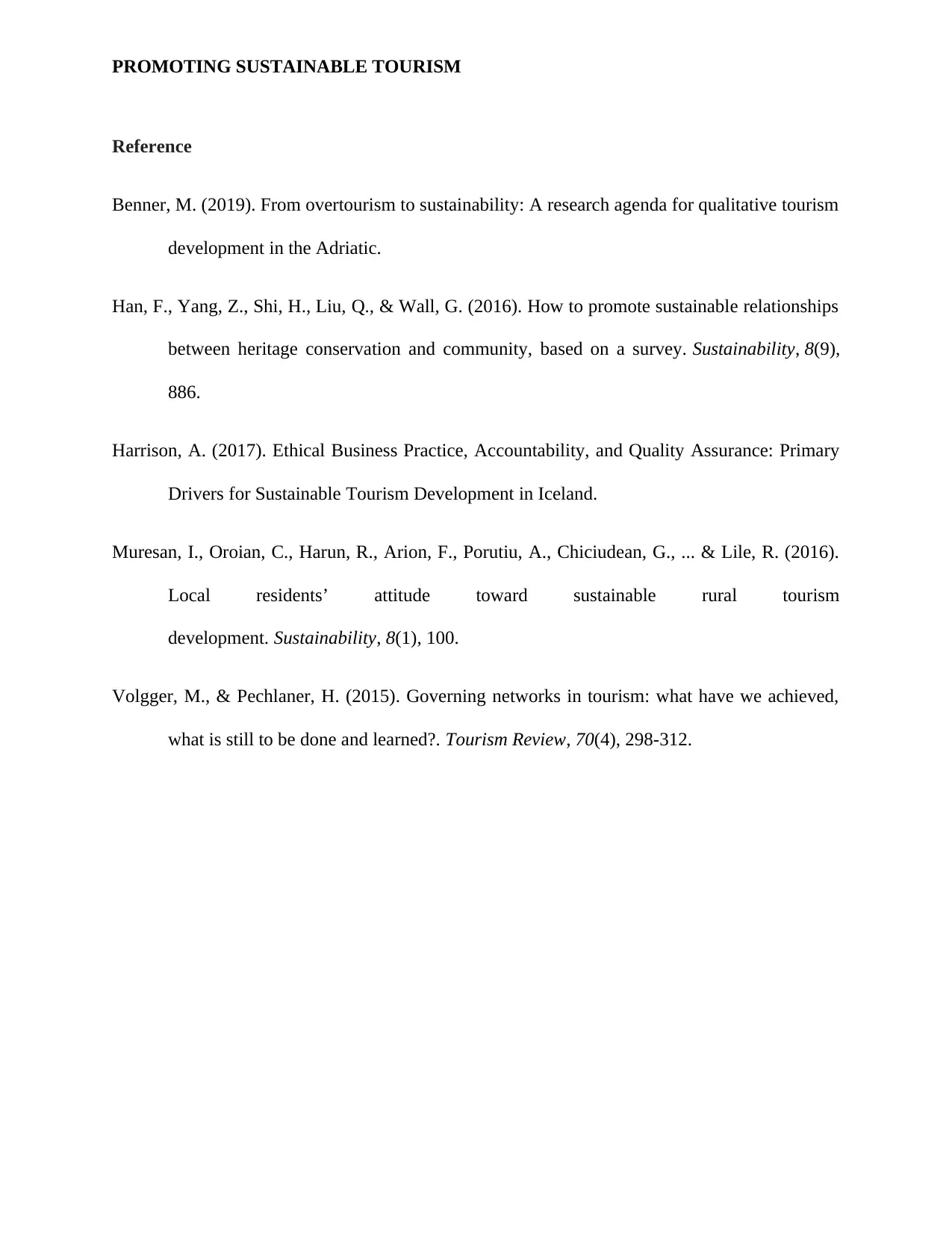
PROMOTING SUSTAINABLE TOURISM
Reference
Benner, M. (2019). From overtourism to sustainability: A research agenda for qualitative tourism
development in the Adriatic.
Han, F., Yang, Z., Shi, H., Liu, Q., & Wall, G. (2016). How to promote sustainable relationships
between heritage conservation and community, based on a survey. Sustainability, 8(9),
886.
Harrison, A. (2017). Ethical Business Practice, Accountability, and Quality Assurance: Primary
Drivers for Sustainable Tourism Development in Iceland.
Muresan, I., Oroian, C., Harun, R., Arion, F., Porutiu, A., Chiciudean, G., ... & Lile, R. (2016).
Local residents’ attitude toward sustainable rural tourism
development. Sustainability, 8(1), 100.
Volgger, M., & Pechlaner, H. (2015). Governing networks in tourism: what have we achieved,
what is still to be done and learned?. Tourism Review, 70(4), 298-312.
Reference
Benner, M. (2019). From overtourism to sustainability: A research agenda for qualitative tourism
development in the Adriatic.
Han, F., Yang, Z., Shi, H., Liu, Q., & Wall, G. (2016). How to promote sustainable relationships
between heritage conservation and community, based on a survey. Sustainability, 8(9),
886.
Harrison, A. (2017). Ethical Business Practice, Accountability, and Quality Assurance: Primary
Drivers for Sustainable Tourism Development in Iceland.
Muresan, I., Oroian, C., Harun, R., Arion, F., Porutiu, A., Chiciudean, G., ... & Lile, R. (2016).
Local residents’ attitude toward sustainable rural tourism
development. Sustainability, 8(1), 100.
Volgger, M., & Pechlaner, H. (2015). Governing networks in tourism: what have we achieved,
what is still to be done and learned?. Tourism Review, 70(4), 298-312.
1 out of 10
Related Documents
Your All-in-One AI-Powered Toolkit for Academic Success.
+13062052269
info@desklib.com
Available 24*7 on WhatsApp / Email
![[object Object]](/_next/static/media/star-bottom.7253800d.svg)
Unlock your academic potential
Copyright © 2020–2026 A2Z Services. All Rights Reserved. Developed and managed by ZUCOL.




